Popular Content
Want Email Updates?
Get emails about new stuff.
Be the first to know.
Looking for Something?
Figurative Language Activities
Students are often required to identify figurative language techniques on standardized tests. Here are a series of figurative language activities to help students better understand and more reliably identify figurative language techniques. Also, you may be interested in these online figurative language practice tests.
Figurative Language Lesson 1
Here is a PowerPoint slideshow lesson on figurative language. It teaches students about simile, metaphor, personification, hyperbole, and understatement. It also includes ten practice problems after the lesson. Use this to teach a lesson on figurative language and provide some practice.

Figurative Language Lesson 2
Here is another version of my figurative language lesson. This PowerPoint lesson includes definitions and examples of figurative language terms. It also includes tips for identifying these techniques. There is also a ten question practice activity at the end of the lesson.

How to Identify Figurative Language Lesson
Here is a one slide presentation with a series of questions that one can ask. Asking these questions will lead students into identifying the correct figurative language technique. This is a great way to begin a class where you review and practice figurative language techniques.

Figurative Language Trashketball Game 1
Looking for a fun, figurative language review game? Check out Trashketball! Students answer questions about figurative language. Then they shoot the quiz paper from correct answers into the trash can for extra credit. A fun and exciting way to review!

Figurative Language Trashketball Game 2
This is a fun practice activity to help students review figurative language. It features 10 more practice problems. Students answer the questions in groups. They shoot their correct responses into the trash for extra credit. My students love this game.

Figurative Language Trashketball Game 3
Trashketball is a review game where students work in groups to answer review questions. They get to shoot their correct answers into the trash can. What a fun and exciting way to review! Here are ten more figurative language practice problems. These should give your students a mental workout.

Figurative Language Matching Activity
Here's a fun, hands-on activity to help your kinesthetic and visual learners become more comfortable with figurative language. This activity takes about ten or fifteen minutes to complete. Students cut out the figurative language examples and match them to the terms.
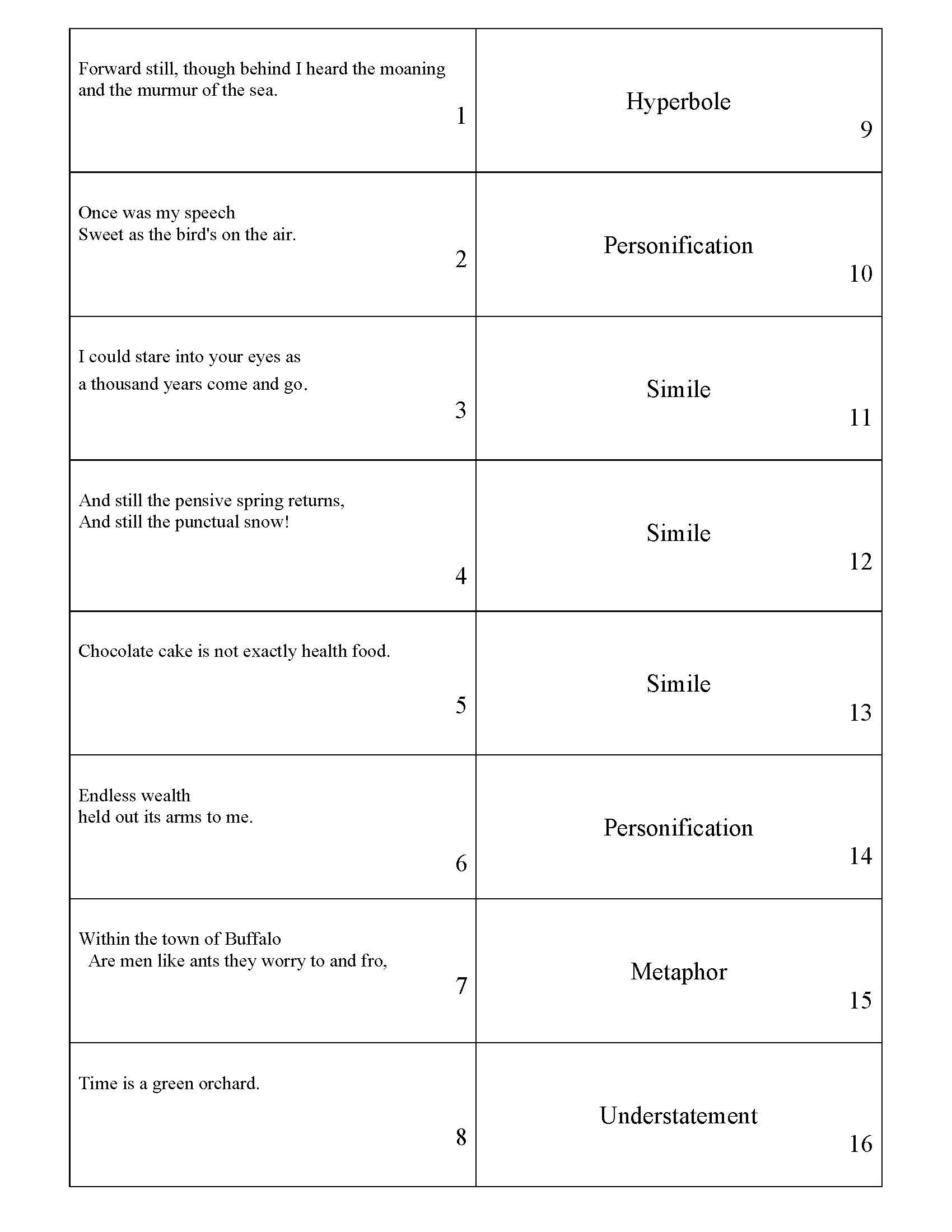
Poetry Scrap Book Project
Are you looking for a fun way for your students to review figurative language techniques and become better acquainted with poetry? Check this figurative language project out. Students make a collection of poems demonstrating simile, metaphor, hyperbole, personification, and idiom.
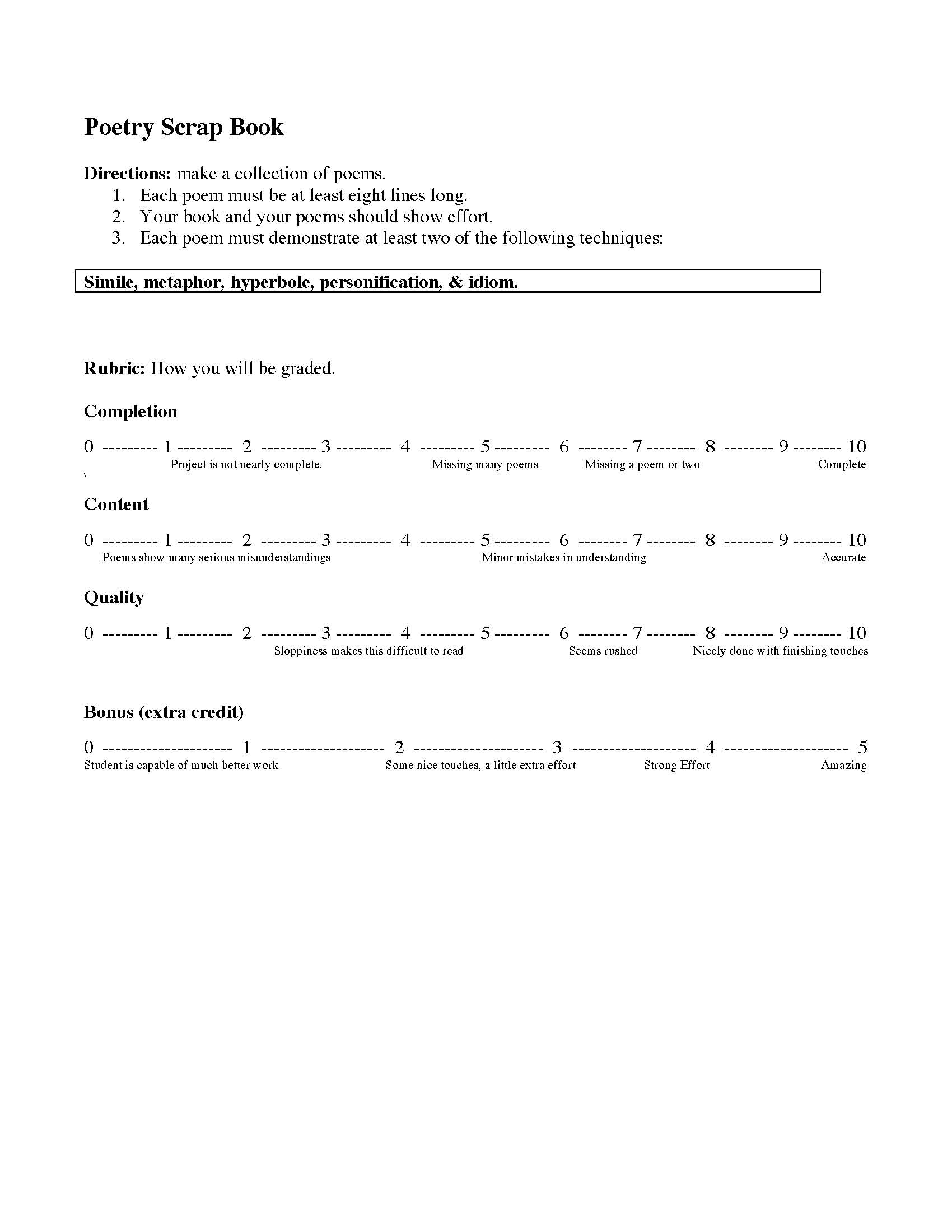
Figurative Language Quiz
Looking for a way to assess your students' understanding of figurative language? Check out this figurative language quiz. It features 10 multiple-choice questions and was designed to be easy to grade.
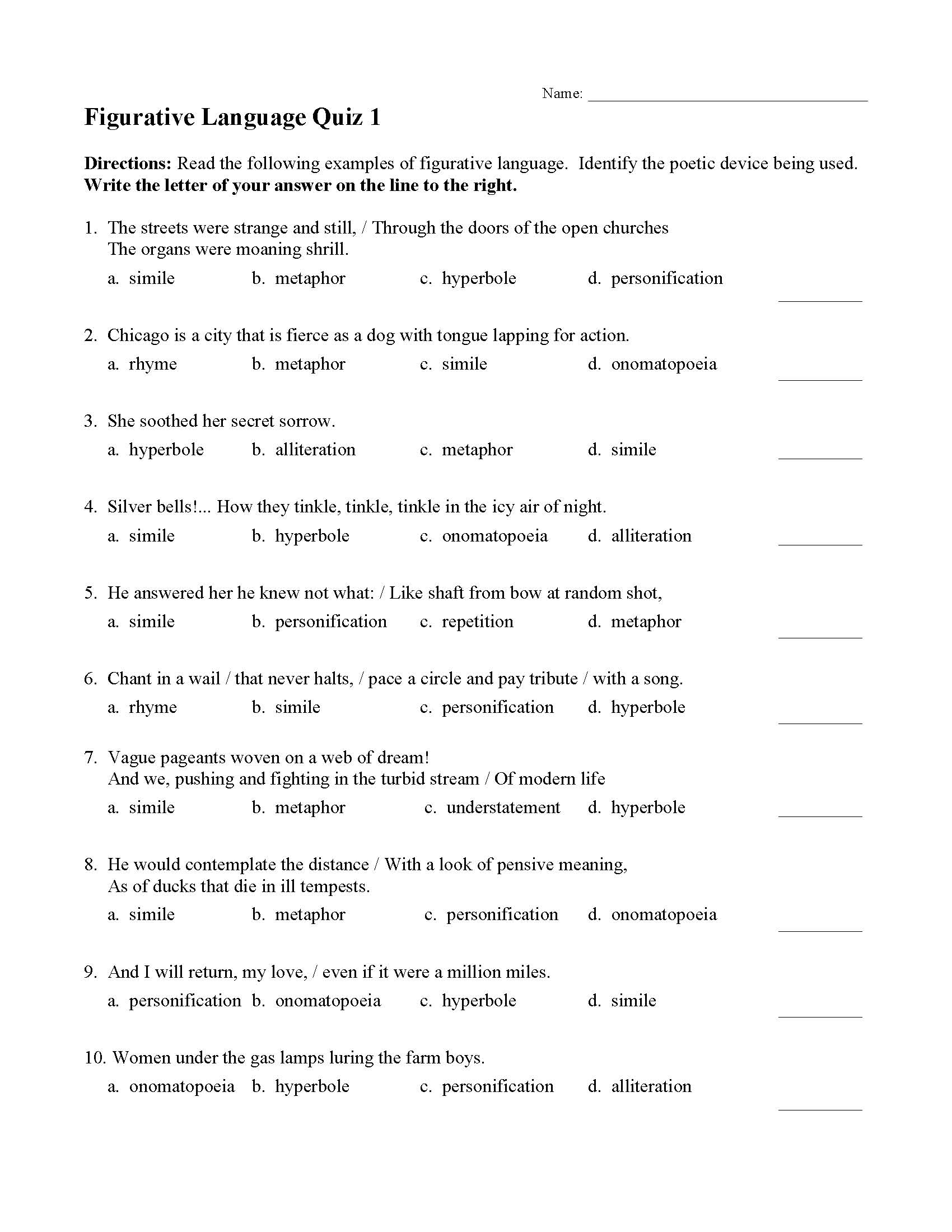
Figurative Language Quiz 2
Here's another figurative language quiz. Use this to quickly evaluate students' understand of figurative language. This quiz has ten multiple choice questions and is easy to grade.
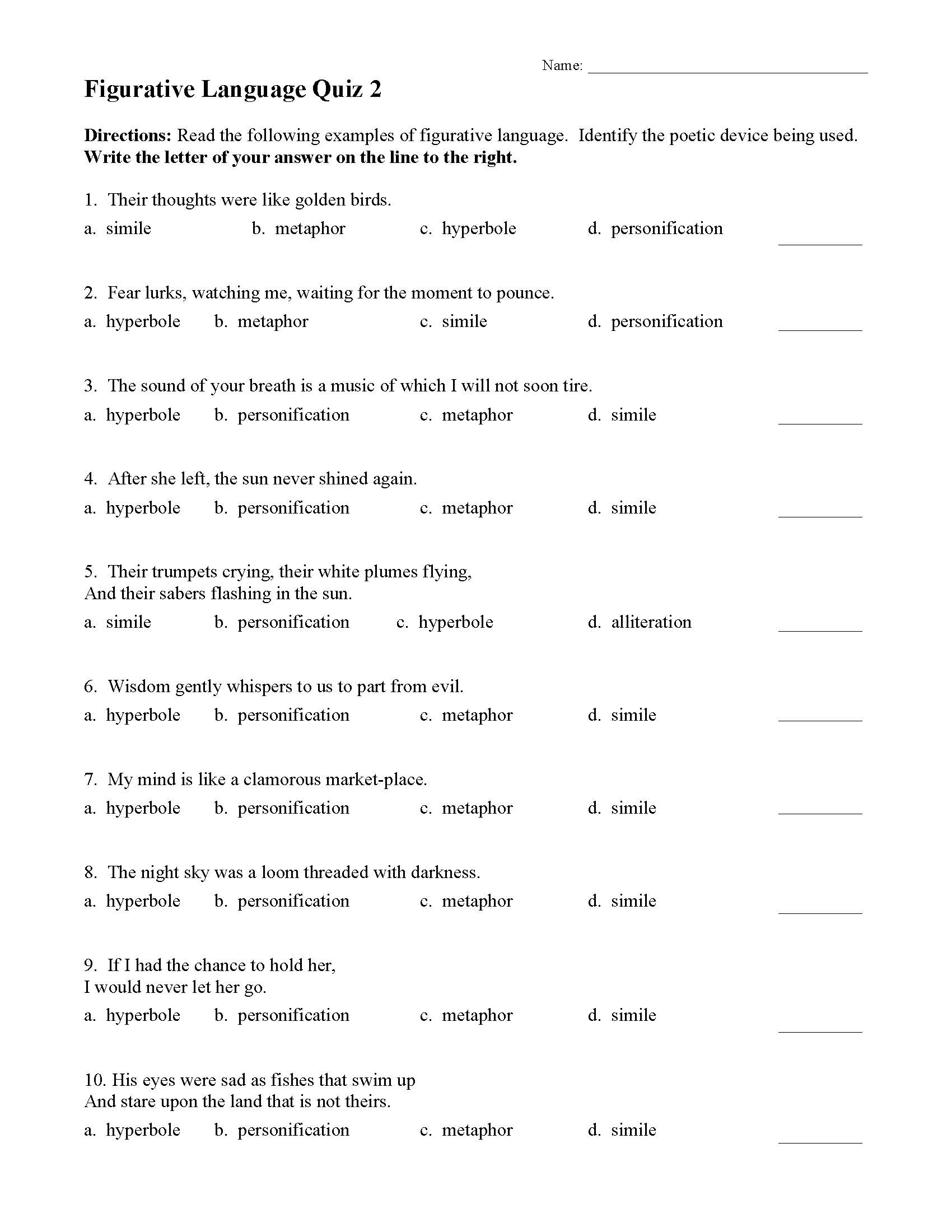
Figurative Language Test
Here is a 40 question figurative language test. This test has a lot of different question types. Match terms to definitions. Identify examples of figurative language. Read two poems and answers questions. Check it out now.
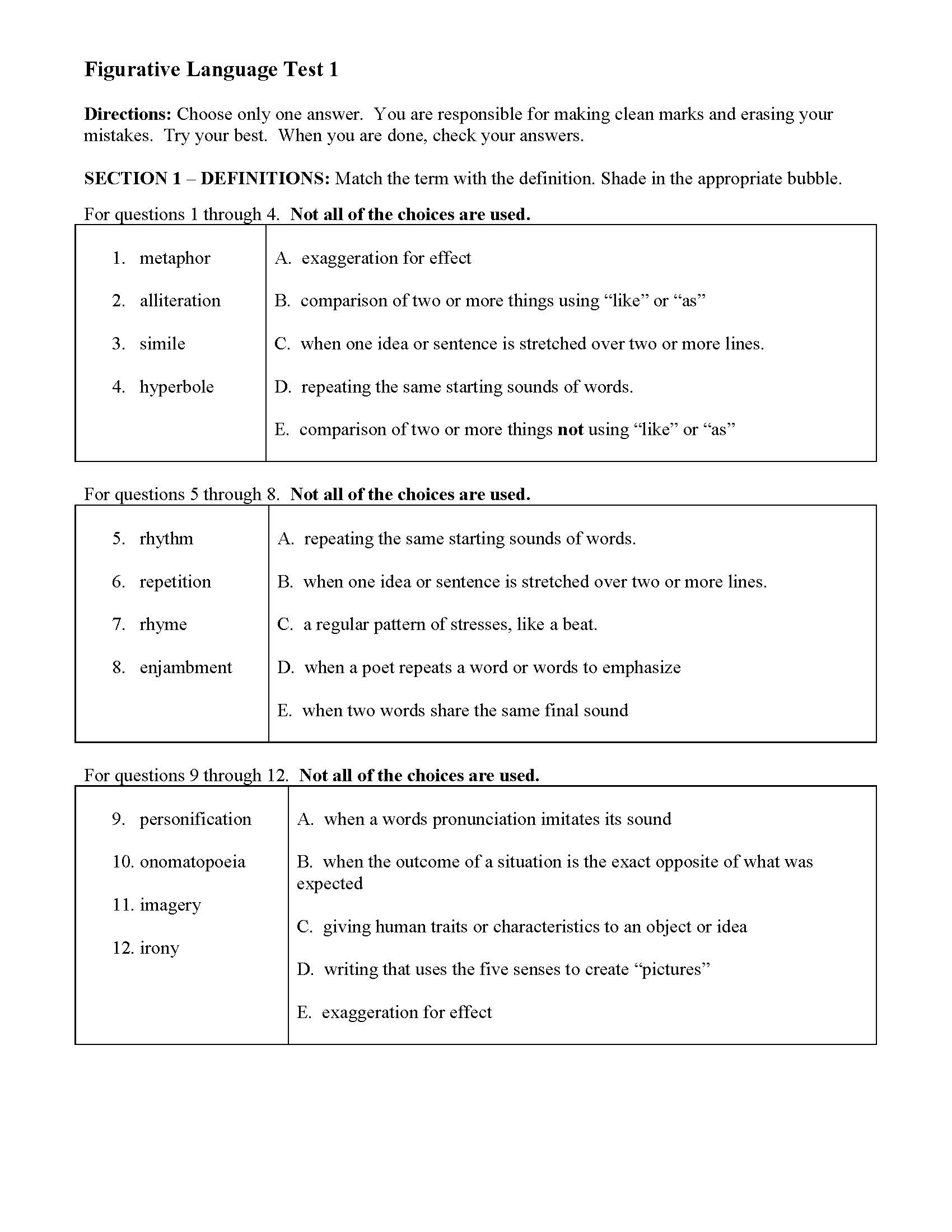
Figurative Language Test 2
Here is another 40 question figurative language test. In the first section, students match terms to definitions. Then they identify figurative language techniques. Last, compare and contrast two poems. This is a great way to assess students at the end of a unit on figurative language.
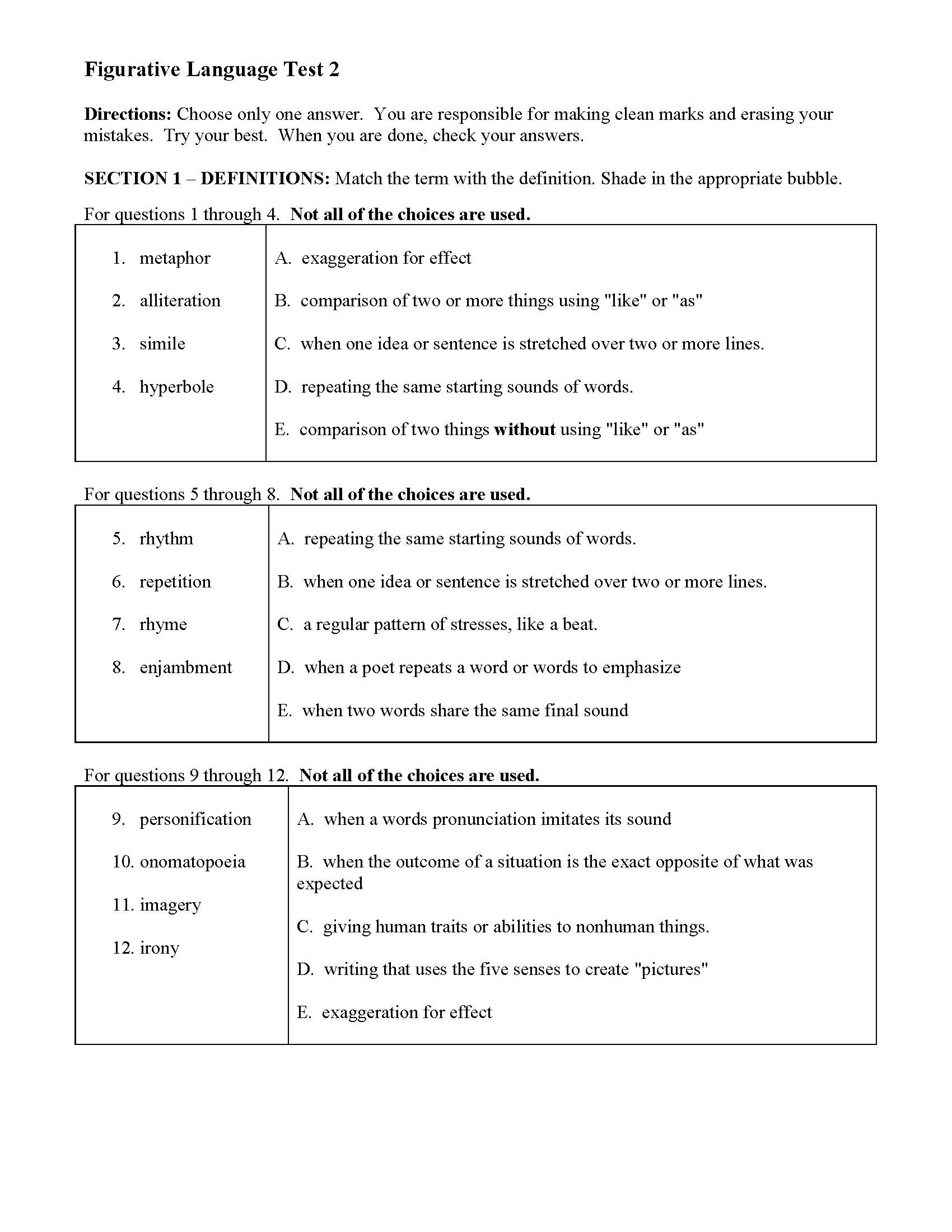
Orpheus The Lyrical: Figurative Language Video Game
Here is a high-interest figurative language video game that I wrote. Students play as the mythical Orpheus in his quest to retrieve his beloved Eurydice from Hades. They will answer literally hundreds of figurative language questions along the way. This is a fun and exciting way to review figurative language techniques and students really get into it.
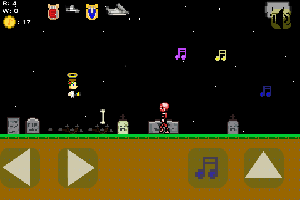
Figurative Language
Common Core State Standards
Figurative Language Anchor Standards
R.4 - Interpret words and phrases as they are used in a text, including determining technical, connotative, and figurative meanings, and analyze how specific word choices shape meaning or tone.RL.2.4 - Describe how words and phrases (e.g., regular beats, alliteration, rhymes, repeated lines) supply rhythm and meaning in a story, poem, or song.
RL.3.4 - Determine the meaning of words and phrases as they are used in a text, distinguishing literal from nonliteral language.
RL.4.4 - Determine the meaning of words and phrases as they are used in a text, including those that allude to significant characters found in mythology (e.g., Herculean).
RL.5.4 - Determine the meaning of words and phrases as they are used in a text, including figurative language such as metaphors and similes.
RL.6.4 - Determine the meaning of words and phrases as they are used in a text, including figurative and connotative meanings; analyze the impact of a specific word choice on meaning and tone.
RL.7.4 - Determine the meaning of words and phrases as they are used in a text, including figurative and connotative meanings; analyze the impact of rhymes and other repetitions of sounds (e.g., alliteration) on a specific verse or stanza of a poem or section of a story or drama.
RL.8.4 - Determine the meaning of words and phrases as they are used in a text, including figurative and connotative meanings; analyze the impact of specific word choices on meaning and tone, including analogies or allusions to other texts.
RL.9-10.4 - Determine the meaning of words and phrases as they are used in the text, including figurative and connotative meanings; analyze the cumulative impact of specific word choices on meaning and tone (e.g., how the language evokes a sense of time and place; how it sets a formal or informal tone).
RL.11-12.4 - Determine the meaning of words and phrases as they are used in the text, including figurative and connotative meanings; analyze the impact of specific word choices on meaning and tone, including words with multiple meanings or language that is particularly fresh, engaging, or beautiful. (Include Shakespeare as well as other authors.)
Click to VIEW Grade Level Standards for R.4
L.5 - Demonstrate understanding of figurative language, word relationships, and nuances in word meanings.
L.3.5a - Distinguish the literal and nonliteral meanings of words and phrases in context (e.g., take steps).
L.4.5 - Demonstrate understanding of figurative language, word relationships, and nuances in word meanings.
L.4.5a - Explain the meaning of simple similes and metaphors (e.g., as pretty as a picture) in context.
L.5.5a - Interpret figurative language, including similes and metaphors, in context.
L.6.5 - Demonstrate understanding of figurative language, word relationships, and nuances in word meanings.
L.6.5a - Interpret figures of speech (e.g., personification) in context.
L.7.5 - Demonstrate understanding of figurative language, word relationships, and nuances in word meanings.
L.7.5a - Interpret figures of speech (e.g., literary, biblical, and mythological allusions) in context.
L.8.5 - Demonstrate understanding of figurative language, word relationships, and nuances in word meanings.
L.8.5a - Interpret figures of speech (e.g. verbal irony, puns) in context.
L.9-10.5 - Demonstrate understanding of figurative language, word relationships, and nuances in word meanings.
L.11-12.5 - Demonstrate understanding of figurative language, word relationships, and nuances in word meanings.
L.11-12.5a - Interpret figures of speech (e.g., hyperbole, paradox) in context and analyze their role in the text.
L.3.5a - Distinguish the literal and nonliteral meanings of words and phrases in context (e.g., take steps).
L.4.5 - Demonstrate understanding of figurative language, word relationships, and nuances in word meanings.
L.4.5a - Explain the meaning of simple similes and metaphors (e.g., as pretty as a picture) in context.
L.5.5a - Interpret figurative language, including similes and metaphors, in context.
L.6.5 - Demonstrate understanding of figurative language, word relationships, and nuances in word meanings.
L.6.5a - Interpret figures of speech (e.g., personification) in context.
L.7.5 - Demonstrate understanding of figurative language, word relationships, and nuances in word meanings.
L.7.5a - Interpret figures of speech (e.g., literary, biblical, and mythological allusions) in context.
L.8.5 - Demonstrate understanding of figurative language, word relationships, and nuances in word meanings.
L.8.5a - Interpret figures of speech (e.g. verbal irony, puns) in context.
L.9-10.5 - Demonstrate understanding of figurative language, word relationships, and nuances in word meanings.
L.11-12.5 - Demonstrate understanding of figurative language, word relationships, and nuances in word meanings.
L.11-12.5a - Interpret figures of speech (e.g., hyperbole, paradox) in context and analyze their role in the text.
Click to VIEW Grade Level Standards for L.5
Still looking for something?
Search here.
Search here.
Leave a comment
64 Comments
Leave a Reply to Mr. Morton Cancel reply
By Using This Website You Agree to the Terms of Use and are aware of our privacy policy.
Subscribe Now
Get emails about new stuff.
Don't worry. I hate spam too.
Some Other Useful Pages
- Author's Purpose Worksheets
- Characterization Worksheets
- Conflict Worksheets
- Fact and Opinion Worksheets
- Figurative Language Activities
- Figurative Language Poems with Questions
- Genre Activities
- Irony Worksheets
- Making Predictions
- Mood Worksheets
- Nonfiction Passages and Functional Texts
- Parts of Speech Worksheets
- Poetic Devices
- Point of View Worksheets
- School Project Ideas
- Setting Worksheets
- Simile and Metaphor Worksheets
- Story Structure Worksheets
- Text Structure Worksheets
- Theme Worksheets
- Tone Worksheets
- ALL PAGES AND WORKSHEETS
Search This Site








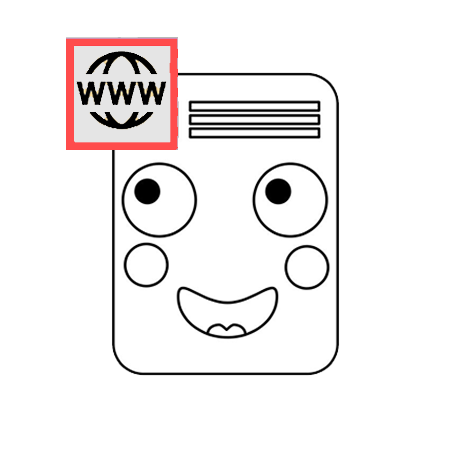
Tzippy
/ November 24, 2024I was struggling with making worksheets and then your site popped up!
Thank you so much! You’ve got some great worksheets!
(I hope you expand your material for high school teachers because this is awesome!)
Adriana Murillo
/ February 7, 2024One of the most useful websites with worksheets I have ever seen. Materials are also varied and good quality. I teach higher education and this is so useful.
Mr. Morton
/ February 7, 2024Thank you!
imene
/ November 17, 2022best website ever 🙂
Brian Pridemore
/ November 6, 2020I like this website
Julie
/ November 3, 2020This is amazing! Thank you sooo very much!
abid
/ January 27, 2020do you need to pay for this site as it is brilliant and I can believe it has been free so far
Melissa Berrier
/ February 18, 2017I have used your site many times in my 7th grade classroom, and I love it! Thank you so much for posting SO MUCH information and resources! Your site is truly unmatched! Thank you so much!
Mr. Morton
/ March 13, 2017That’s so nice of you to say. Thank you for visiting and taking the time to comment. I appreciate it.
Maisara
/ November 9, 2016Thankyou
This site is amazing!!
It must have taken a long time
This really helped with my english school work
Thanks again!!
🙂
Krishna solasa
/ November 8, 2016this website is awesome
Melissa Betonio
/ January 6, 2016Helpful.Well-appreciated.
Thank you for the love.
Melissa
/ January 6, 2016Thank you. Such a great help. Effort highly appreciated.♥️
Dani
/ December 17, 2015Thank you so much for posting all of this! My 7th graders are not very interested in figurative language and I think the Orpheus game will definitely help!
Mrs.Chesson
/ January 15, 2015I love this cite it helped me and my class.
They learned more about figurative language and they all passed my test.Thank you for posting this cite.
Mrs.Chesson
/ January 15, 2015I love this website because it helped me and my class.Thanks for sharing this site.
Robin
/ November 16, 2014Thank you so much for the information. It really helped me out a lot!
mildred meigs
/ June 19, 2014You didn’t answer my questions!
Mr. Morton
/ June 19, 2014What were they?
jaheim
/ November 7, 2013I love it
Tri Murni
/ June 19, 2013What a remarkable work..thanks for sharing such a great resources. My students and I will have a great fun time with poetry 🙂
Adam Hashim
/ May 22, 2013thank you. it is such a valuable resource for my job as a teacher of english language for arab students.
josht@wapato
/ April 19, 2013I really appreciate the content and the easy manueverability of the site. I found the things I needed in a few clicks. You are a great resource for teachers like me! THANK YOU!!!
YWigfall
/ January 31, 2013This is a wonderful site. We had a great time in class reviewing figurative language with the powerpoints then doing a quick assessment with the “Trashkitball” game. My students loved earning extra credit, and they loved trying to make 3 point shots.
Mr. Morton
/ February 3, 2013That’s one of our favorites too.
Moses
/ December 5, 2012Hello, I would like to ask for some assistance in writing a persuasive paper. My topic is Deforestation. Areas of interest are Africa and The Amazon. I have researched information about it through my college’s library online database. I am having trouble comprehending how to go about writing it. I have been at it for about 3 weeks roughly a month to be honest. I have tried several measures yet somehow nothing has worked. I have an introduction and conclusion. However they are subject to change. I know.
Mr. Morton
/ January 5, 2013You have to read a lot about your topic. Become an expert. Read at least five sources thoroughly. Then you’ll be something of an expert and will have things to say about the topic.
Nicole
/ September 26, 2012Thank you, thank you, thank you! It is difficult to find good resources that are so readily available online these days. I have used many of your lessons as formative and sometimes as part of my summative assessments.
Love how they use actual poetry rather than other figurative language lessons which make up sentences.
Your students are very lucky to have you!
Mr. Morton
/ September 27, 2012That’s kind of you to say. Thanks for visiting!
Richard
/ July 18, 2012I found this site a few days ago and have already recommended it to a few friends. Thanks to the creators of this site.
Mr. Morton
/ August 10, 2012You’re welcome. Thanks for visiting!
paola cabrera
/ June 11, 2012thanks that work sheet help me a lot but i dont know where are the answers
Suaad
/ April 12, 2012Thank you so so much! As a teacher on a tiny island in the middle of the Pacific Ocean, this website is such a valuable resource. Thank you so much for putting your time and effort into this website. I LOVE it! I’ve already shared it with my colleagues. Much love from Tinian, CNMI!
Mr. Morton
/ April 15, 2012That’s amazing. Thank you for sharing your experience.
crazy eesha
/ March 17, 2012i love this gave me evrything for my test <3
didine
/ February 2, 2012What grade level are these figurative language activities for?
Mr. Morton
/ February 13, 2012I use them with my seventh and eighth grade students. You could download the RTF files and edit them to use with any grade level though.
Michael
/ January 29, 2012Thank you for this site. This has helped me out tremendously. I am a first year teacher and I was beginning to get frantic and this has helped! Hope to hear from you soon!
Mr. Morton
/ February 13, 2012Awesome. I’m going to be adding new material to this section any day now… Thanks for visiting!
christine morabito
/ January 29, 2012Absolutely fantastic and creative ideas!!!! THANK YOU SO MUCH for sharing!!!!
Mr. Morton
/ January 31, 2012It’s my pleasure! Come back again. 😀
marathonmom03@gmail.com
/ January 13, 2012On the Poetry Quiz, (answer sheet) #10 is personification. Again, thank you for such a great website! 🙂
Mr. Morton
/ January 14, 2012Yes, if you read the line as though the lamps were doing the luring, then it would be personification. Thank you for pointing this out and come back soon!
marathonmom03@gmail.com
/ January 13, 2012Wow! You have saved me hours of work! Thank you so much! What a treasure of a website. Can you double check the answer on the poetry quiz, I’m pretty sure #7 is alliteration. Also, #10, isn’t alliteration, but I’m not actually sure what it would be.
Mr. Morton
/ January 14, 2012Hi. Thanks for saying so.
You’re right about #7. It is alliteration. But it is also a metaphor, since the speaker is implicitly comparing pretty words to pets. I did not offer alliteration to my students as a choice because we spent some time in class discussing this as a metaphor within the context of the poem.
#10 is not richly alliterative, but it does have the combination “lamps luring.” I teach my students that alliteration can be as simple as two words in close proximity to one another sharing the same initial consonant sound.
Thanks for visiting!
Yvonne
/ January 9, 2012Thanks I love this stuff!!! My students love the powerpoints as well.
YMWPoohBear
/ January 9, 2012I really love these lessons and especially the powerpoints… they are awesome and I use them in my classroom. Can not wait to use the detective activity for IRONY… Thanks a bunch… More more more…
Mr. Morton
/ January 31, 2012Awesome! Your comment inspired me to add another irony worksheet. Go school!
Betty
/ November 23, 2011This resource is outstanding. Thank you very much. My students are improving with each of the lessons. Again thank you!!!!
Mr. Morton
/ December 1, 2011I’m happy to hear it.
Thanks for visiting!
Linda
/ November 15, 2011Fantastic site!!! I love the material. I am excited to share the powerpoints with my students. GREAT JOB! Thank You
Mr. Morton
/ November 21, 2011Thanks for visiting!
Tomer Maimran
/ October 25, 2011This site is amazing! Your worksheets are well thought out, thought inducing and my students love them! Thank you for helping me improve my craft!
Sam
/ October 20, 2011Men are dogs? Wow. How unprofessional is that? We may have established a new low…
Mr. Morton
/ November 7, 2011Thanks for visiting. Who’s “we”?
Jenny
/ October 13, 2011This website is wonderful! I am going to edit these to meet my 5th grader’s learning goals. Thanks!
Mr. Morton
/ October 19, 2011That’s awesome, Jenny. That’s exactly what I encourage visitors to do. I’ll be adding more figurative language resources in the coming weeks. Stop by sometime soon.
Rebecca
/ October 11, 2011Thank you thank you thank you thank you!!!! It is very generous of you to share all of this good stuff! May lots of good karma come your way ; )
Mr. Morton
/ October 19, 2011It already has. Thank you for visiting Rebecca, and may you find great success in your classroom and in the profession.
Amellia
/ September 8, 2011Thank you so much for doing this! These worksheets have been a tremendous help in my classroom. I also shared them with a colleague of mine, and she is using them as well.
I love the poem examples. In fact, I searched for all the poems online and will be reading them to my classes this year.
Again, thank you for sharing!
Kate
/ April 14, 2011Two things –
This site and its activites are truly extraordinary. I appreciate the content, the cleanliness of the visuals, the breadth and the depth of what you’ve provided. I’m not one to gush, but I am truly impressed by your work here. This site must be a labor of love for you. The work you’re sharing here is very much appreciated.
BTW, slides 5 and 9 of the Trashsketball ppt have tiny typos. Columbus was /off/ course and Annabelle Lee wants nothing more /than to be loved by/ me.
Thank you so much for your work and sharing it!
Mr. Morton
/ April 16, 2011Wow, Kate, you’re too kind.
I have updated the erred slides.
Thanks a bunch for telling me about the typos.
As much as I tell my students to do so,
I really ought to proof read more.
But, I’m sure there are more errors scattered around the site.
If you or anyone else spots a typo please leave a comment
or email me directly: mortonteaches@gmail.com
and I will fix the mistake.
Thanks again, Kate.
Regan
/ April 11, 2011Please post the answers to the test
Mr. Morton
/ April 16, 2011Done. Thanks for visiting.